Using affiliate marketing in e-commerce is a popular strategy for online businesses to expand their reach and increase sales. It’s not a surprise because 79% of online brands use affiliate marketing to promote their products and increase sales.
Implementing an affiliate marketing program can significantly benefit your e-commerce store in many ways. But, before performing an affiliate program in e-commerce you need to understand affiliate marketing.
This article will explore why every e-commerce store needs an affiliate program, how it works, and some examples of successful e-commerce affiliate programs.
Let’s get started!
Launch your affiliate program with Relay’s tired commission feature and attract high-quality affiliates
What is affiliate marketing in e-commerce?
Affiliate marketing is a performance-based marketing strategy where businesses reward affiliates for driving sales to their stores. Affiliates use their platforms like blogs, social media, or other online channels to promote the merchant’s products or services.
When a customer makes a purchase through an affiliate’s unique referral link, the affiliate earns a commission.
Affiliate programs are mutually beneficial. The affiliates get a commission from the sales they generate, and the store owners get more customers without having a hole in their pocket by spending on advertising.
So, it’s a win-win for both parties.
How does affiliate marketing work?
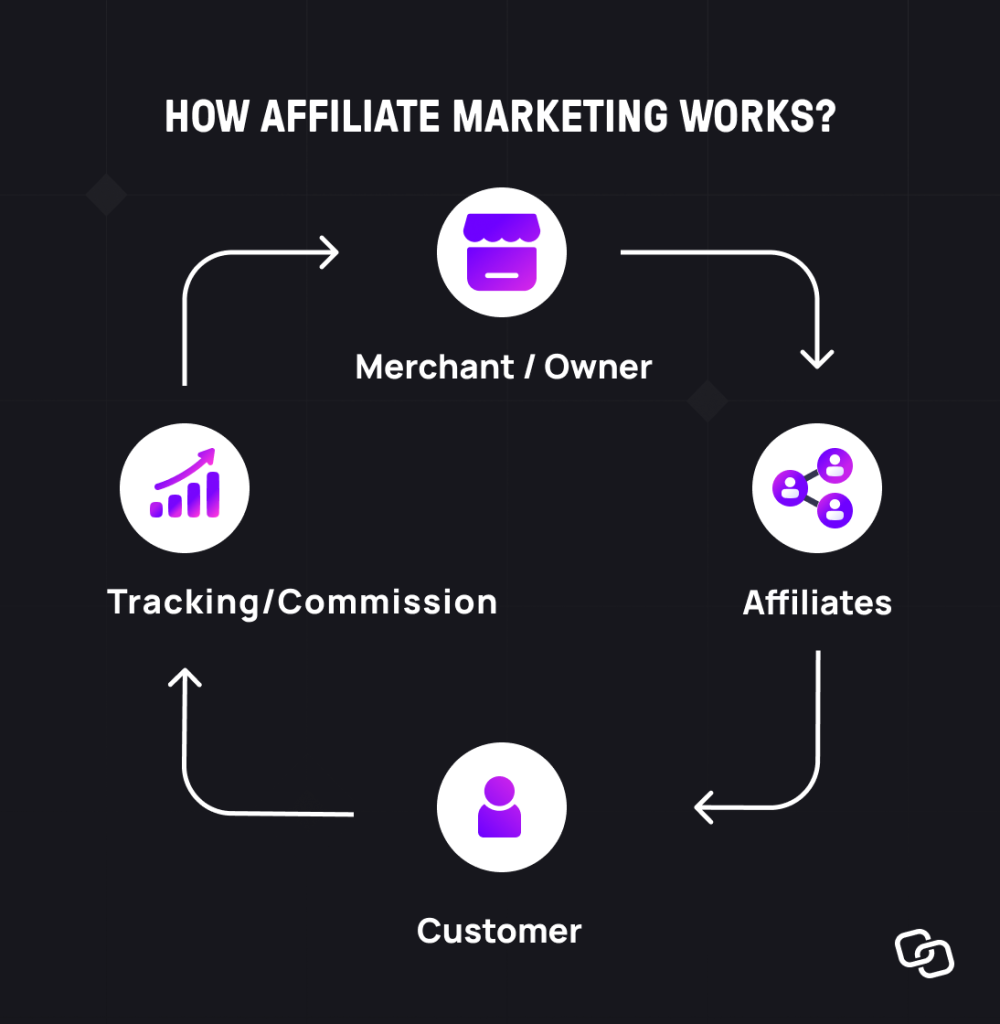
Affiliate marketing operates on a straightforward approach. Businesses use affiliates’ reach to market their products or services.
For instance, if you heard the statement “T purchase, check out the link in bio” in a reel then you have been a recipient of affiliate marketing.
Here’s a step-by-step breakdown of how it works:
- Merchant / Owner: An e-commerce store owner who wants to promote its products or services.
The sellers will not be involved in the product marketing directly. They set up affiliate programs and allow affiliates to promote them. - Affiliates: These are individuals or companies that promote the merchant’s products on their platforms.
Affiliates can be marketers, bloggers, or influencers. They promote the seller’s product and earn commissions. - Customer: The end consumer who purchases the product through the affiliate’s referral link.
- Tracking and Commission: Affiliates use unique referral links. When a customer clicks on one of these links and makes a purchase, the sale is tracked by the owner, and the affiliate earns a commission.
These steps are the basics of affiliate marketing. Affiliate marketing in e-commerce can be set up in various ways, but the basics remain the same. By understanding these, you can create a successful affiliate marketing strategy for your e-commerce store.
Why does your e-commerce store need an affiliate program?
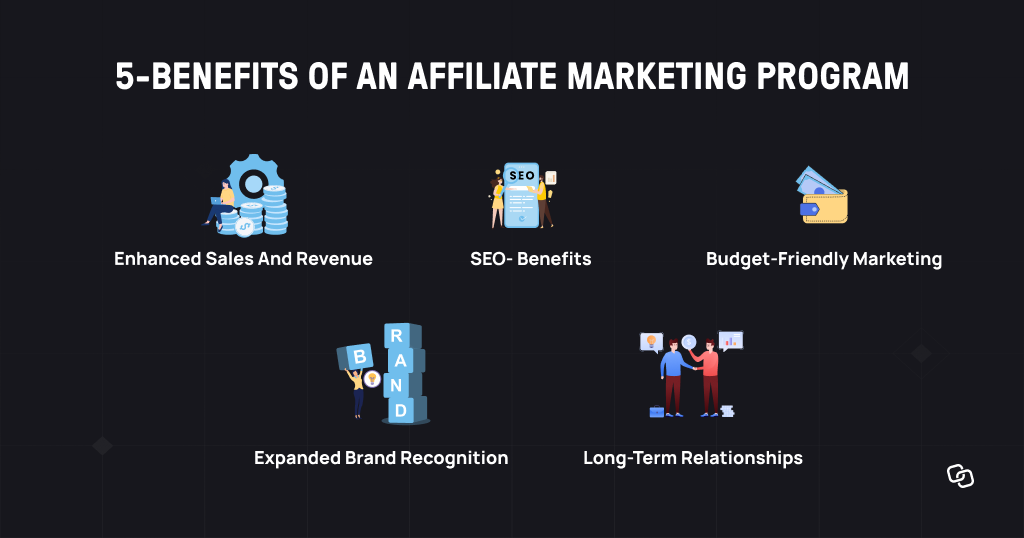
There are numerous benefits to implementing an affiliate program in your e-commerce store.
1. Enhanced sales and revenue
An affiliate marketing program helps to bridge the gap between your store and potential customers with the help of affiliates. The affiliates who already have an established audience in the niche can help you reach more potential audiences thus more sales.
2. Expanded brand recognition
Affiliate marketing in e-commerce helps with brand recognition too. By promoting your brand with diverse affiliates, you have a high chance of achieving broader recognition.
A study shows that 81% of brands use affiliate programs to increase brand awareness and drive sales. You can also become one among them by utilizing affiliate marketing in e-commerce.
3. Budget-friendly marketing
Affiliate marketing in e-commerce is a great way for startups or businesses operating in tight budget restraints. You only spend when sales are generated. Unlike the traditional marketing program, there is little concern about financial losses. This makes e-commerce affiliate programs a great choice for marketing.
It also provides a great opportunity to improve SEO as affiliates backlink your website in their blogs or social media posts while promoting. This helps in search engine rankings, enhancing your overall SEO efforts.
4. SEO- Benefits
Better SEO means higher visibility and more organic traffic to your e-commerce store. Incorporating Affiliate Marketing in e-commerce into your strategy can have long-term benefits for your online presence.
5. Long-term relationships
Affiliate marketing in e-commerce helps increase customer lifetime value (CLV) by driving high-quality traffic from affiliates who have established trust and credibility with their audience.
This trust translates into loyal customers who are more likely to make repeat purchases. Additionally, affiliates often provide ongoing engagement and promotions, keeping customers consistently involved with the brand, thereby increasing their overall spending over time.
Affiliate Marketing ensures that your e-commerce store remains competitive and continuously grows.
Engage with affiliates through Relay’s customizable affiliate management to increase your brand’s visibility
5 Affiliate marketing in e-commerce examples
Here we have listed a few brands that successfully run their affiliate program to help you get insights into the effectiveness of affiliate marketing in e-commerce.
Zalando
Zalando, a leading fashion and lifestyle e-commerce retailer in Europe, runs its affiliate program through the Awin network.
Zalando’s affiliate program allows affiliates to promote a wide range of fashion items, footwear, and accessories. Their affiliate program offers commissions of up to 10% on sales, depending on the product category and the affiliate’s performance.
They also provide access to a variety of banners, widgets, and deep links to enhance their affiliate’s promotional efforts. This approach helps affiliates stay relevant in a fast-changing market and effectively reach fashion-conscious customers and also makes it one of the best e-commerce affiliate programs.
URL: Zalando affiliate program
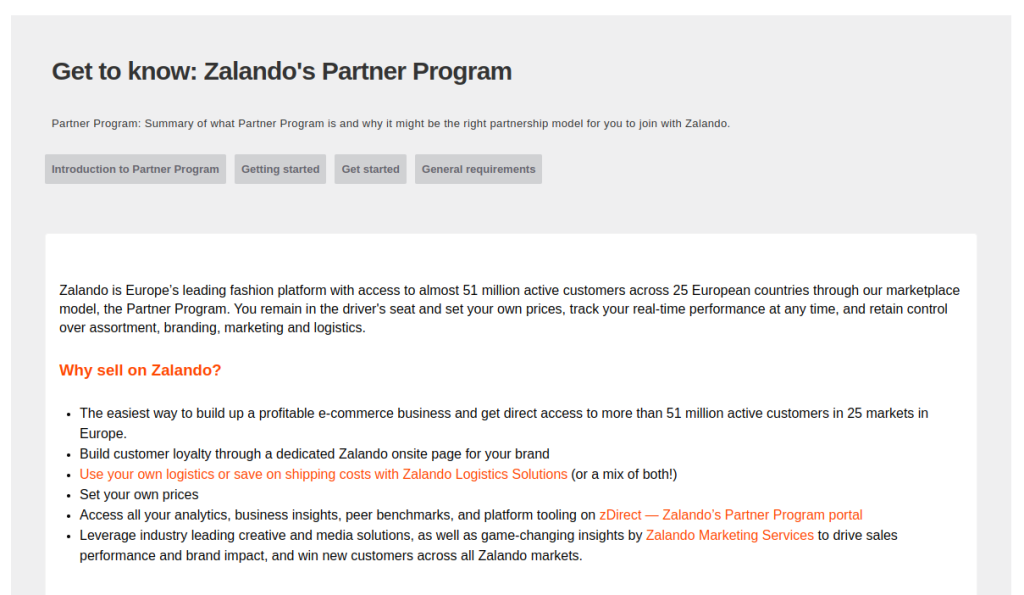
ASOS
ASOS is an international fashion and cosmetic retailer which primarily targets young adults. It offers a wide range of trendy clothing, footwear, accessories and beauty products.
ASOS focuses on fast fashion, regularly updating its inventory with the latest trends to attract a young and fashion-forward customer base. This strategy makes it the best affiliate marketing program to choose for fashion bloggers and influencers.
Their affiliate marketing program offers up to a 7% commission rate.
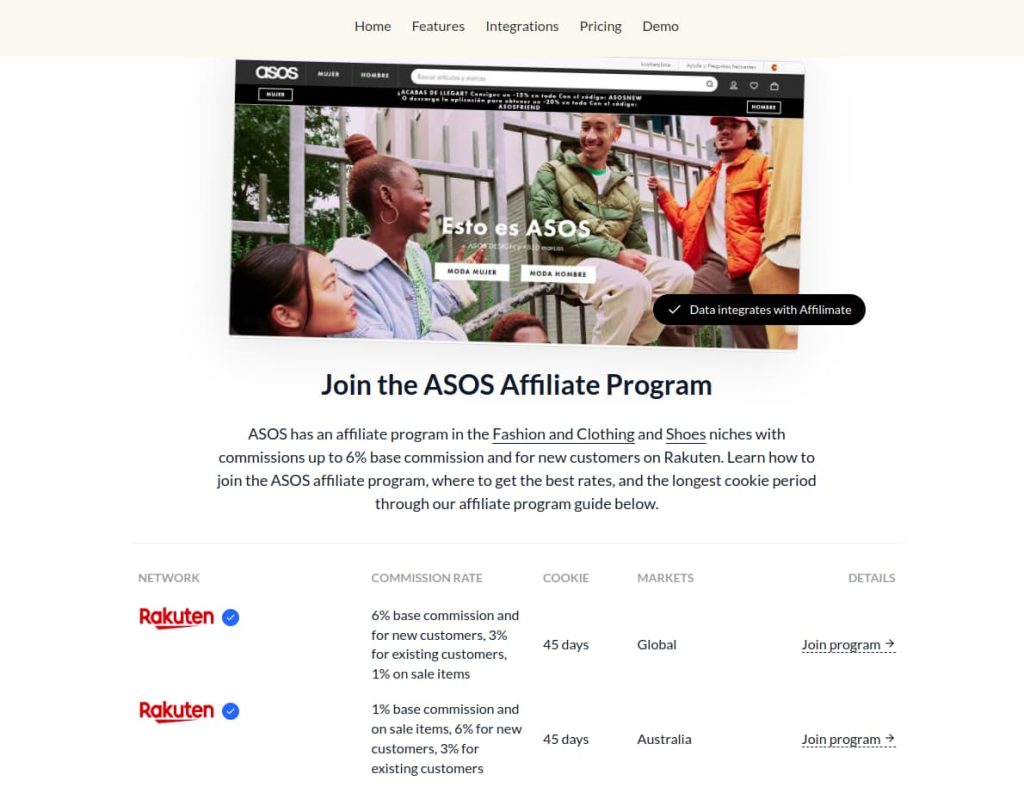
James Allen
James Allen is a New York-based online jeweler known for their engagement rings, loose diamonds, and fine jewelry. The company is also famous for its innovative 360° Diamond Display Technology.
James Allen’s affiliate program is a great example of success in a niche market. The focus on high-end jewelry allows affiliates to target a specific audience enhancing the program’s effectiveness and profitability and also making it one of the best e-commerce affiliate programs.
The James Allen Affiliate Program offers a commission rate of up to 5% on sales, with opportunities for higher rates based on performance.
URL: James Allen affiliate program

Vitamin Shoppe
Vitamin Shoppe is an American retailer of nutritional supplements and health-related products. Their affiliate program is managed through the CJ affiliate network.
Vitamin Shoppe’s program excels in the health and wellness niche. By providing detailed product descriptions and valuable health-related content to affiliates they promote them as the best affiliate marketing program. This focus allows affiliates to build authority in the health sector and target a dedicated consumer base.
Through Vitamin Shoppe’s affiliate program, the affiliates earn up to 10% commission on referred sales.
URL: Vitamin Shoppe affiliate program

Wayfair
Wayfair is an American e-commerce company that sells furniture and home goods. It operates various online retail brands and provides a diverse range of products, including home furnishings, decor, and appliances.
Wayfair’s program is recognized as one of the best e-commerce affiliate programs due to its extensive range of home goods and seasonal promotions.
Their affiliate marketing program offers up to a 7% commission rate.
URL: Wayfair affiliate program
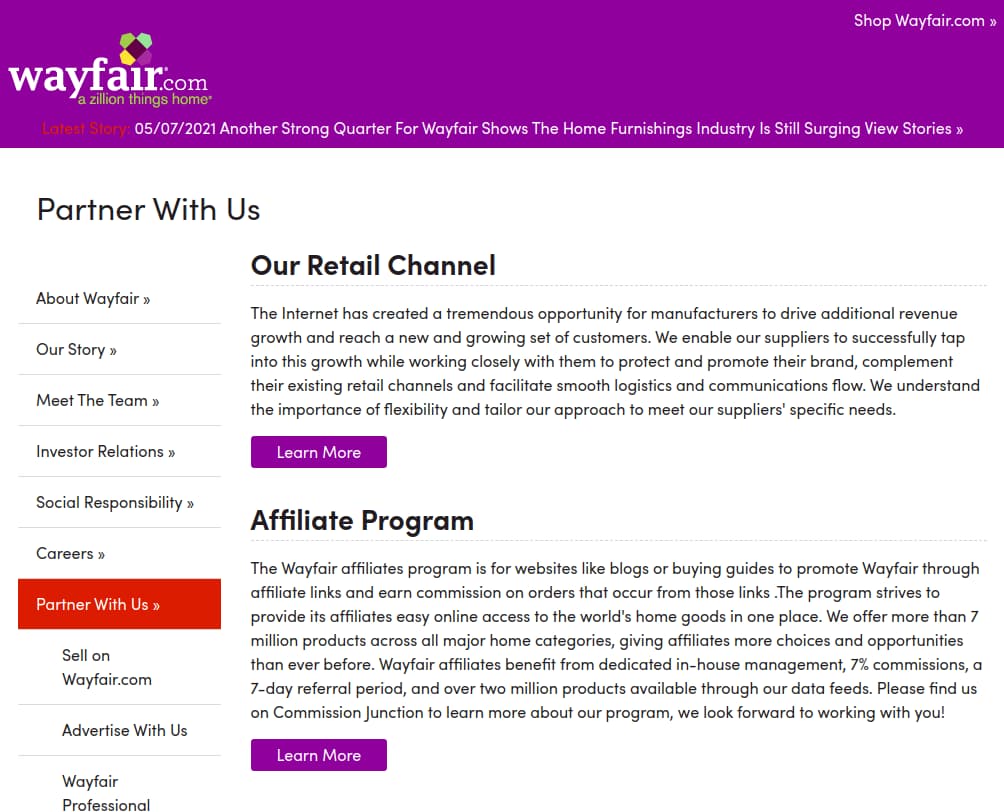
Start your affiliate program with Relay’s user-friendly interface, and track affiliates’ performance in minutes.
Conclusion
It’s safe to say that, incorporating an affiliate program into your e-commerce store isn’t just a smart move but also an essential step to success.
Affiliate marketing in e-commerce helps you build a network of advocates for your brand. So, if you haven’t already, now is the perfect time to start an affiliate program in your e-commerce strategy and watch your business grow. Happy selling!
Also read,
- Why does affiliate marketing fail? 7 Common Affiliate Marketing Mistakes you need to avoid
- Influencer Marketing vs Affiliate Marketing: Which is Better?
- How to Convert Your WooCommerce Customers Into Affiliates: A Step-by-Step Guide
Frequently Asked Questions
Yes, affiliate marketing is a form of business-to-consumer (B2C) marketing where businesses partner with affiliates who promote their products or services to consumers. Affiliates earn commissions for each sale generated through their promotional activities.
Affiliate marketing falls under the category of performance-based marketing. It is a type of digital marketing where affiliates promote products and services on behalf of a company, through special links and earn a commission based on the sales they make.
Affiliate marketing is completely legal, provided that marketers adhere to the relevant laws, terms, and disclosure requirements in their jurisdiction.
To sell affiliate products, focus on creating valuable content that resonates with your audience and promote the products. Use various channels like social media, blogs, newsletters, and podcasts to reach potential customers and encourage them to make a purchase.
No, affiliate marketing is not the same as PPC (pay-per-click) advertising, although the two strategies can be used together. In affiliate marketing, publishers earn commissions for promoting merchants’ products, while in PPC advertising, advertisers pay a fee each time their ad is clicked.
Relay is one of the best plugins for managing your affiliate program. From creating affiliate links to setting commission rates, and tracking to payout you can manage everything using this plugin.
The materials used in affiliate marketing include promotional banners, text links, product images, and marketing collateral provided by the merchant, as well as content created by affiliates like blog posts and reviews.
